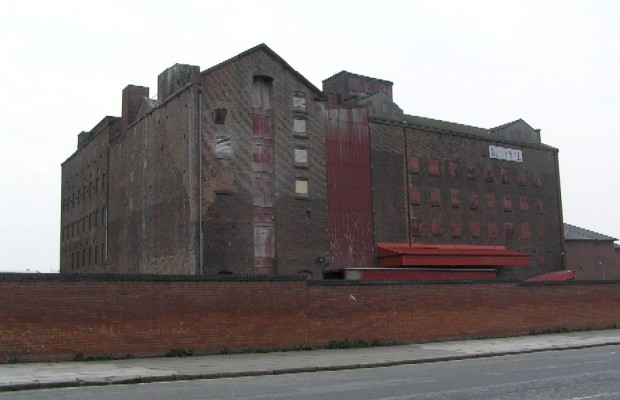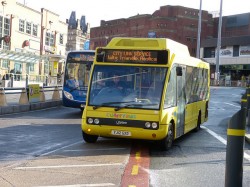Out of time, on the Comfybus

It’s fitting that, as I pack my bags and leave my Baltic shed my passage is halted by the rush of kids from the North Liverpool Academy.
This triangle, now, feels more a place for dreams. More a wish list for the future. Time for me to say goodbye to all that, and realise that it’s time I got my head down.
Anger, they say, is a secondary emotion. It is the world-facing, oafish substitute for fear.
There’s talk of demolishing more grand brick warehouses to be replaced with more student flats. There’s a trench big enough for the Time Team crew next to the Baltic Bakehouse.
What will be left? Not much, just emptiness and memories.
Yesterday, I realised why things like this anger me so much. But it won’t make any difference. And, to the kids at the North Liverpool Academy, it shouldn’t. Not really.
We’re hell bent on moving forward, and wiping our history from the streets. I get it. It’s the way of things, the future. But that doesn’t stop some part of me clinging to the wreckage. And it doesn’t invalidate my right to be upset.
 I kept it in, yesterday, of course. Well, I was on the cumfy bus. It’s wise not to raise the alarm on a low slung vehicle.
I kept it in, yesterday, of course. Well, I was on the cumfy bus. It’s wise not to raise the alarm on a low slung vehicle.
This city. Where every street and spire is numinous with memories. Where taking the bus can transport you back to another place; a place where the future was heavy with promise.
My Liverpool, like yours, is a city stranded between two states. A 3D printed memory map, where the comfort of then crunches headlong into the sudden, disorienting shock of now. And where every step is primed with the peril of memories exhumed.
I took a circular tour on a crisp, sunny morning. An escape route, to bring me back to my senses.
In another summer, I saw this skyline - the same slant of sunlight, the same hotel window where I took tea with my mum. An afternoon wasted yet, unknown to me, stored with a power to sting the eyes served up, 25 years later. To catch me off guard. To bring me up sharp.
It’s scarily easy to time travel through the streets of your hometown. And we should all do it more often. While we can. Because these routes are vanishing fast.
For an hour, I threw my hippocampus into the driving seat and stumbled headlong into the past. Raised up above the Costa facias and the ersatz interiors of Elaine Cunningham you get a film location view of the city. A chance to photoshop out the flaws. This is how I reconnect to the city, and the way it’s pushed itself deep inside me.
When I’m not task-focussed and in the moment - say, when the bus is rocking me into alpha wave submission along Water Street - when I cross the Strand, and see the iridescent tiles of the Tower Building fired in the sun, that’s when Liverpool hits me hardest. That’s when I come home.
We turn the corner into Mann Island and a beacon flares up inside me. I’m seven again, and the Pier Head gyratory is laid out ahead, receding to a vanishing point by the Crowne Plaza Hotel. I’m on the bus to my nan’s. The 544 to Walton Hall Avenue. And the budgie’s in the birdcage on my lap.
It doesn’t last, of course. The illumination is fleeting. But the city that briefly blazed is still there, huddled in the darkness, waiting for us to reignite it.
In the blue shadows of the Pier Head I have my Adlestrop moment. The bus stops, unwontedly, beneath the silent graces. Seagulls wheel above me. It is 1978.
Outside, a man snaps his camera. My companion nudges me. We’re the only ones on the bus. The driver’s gone, and even the seagulls seem suspended.
Nothing bad can happen now. The dead can rise, and all possible futures can begin again.
No feverish deals are being struck in the Mayor’s office. No scaffolding cloaks soon-to-be Shankly Hotels. The thick black hands cease their journey across the Liver Building clocks.
We have slipped out of time. And it’s magical.
Last month, caught short in a sudden spring downpour, with a flat tyre and a missing-in-action AA man, I ran for shelter into Liverpool Cathedral. Evensong was just underway, and I slunk into a chair, somewhere off in the shadows.
Suddenly, everything was wide open. The choral music, the filtered light, the suspension of disbelief. A strange soup of static electrified the great space. A feeling of being on a threshold. Of two spheres touching. Then, too, I was aware of a thousand other states of possibility, and I cried.
We walk these streets with care, because while some journeys connect us to where we’re going -occasionally, and wonderfully, they have the power to connect us to our past.
This is why we care, and why - even though I know it’s time - leaving places, the Baltic, your first job, the city - hurts.
When I get off the bus, for a while I’m disoriented. I’ve lost something, I’m convinced of it. I pat my pockets as the bus departs. Then I remember, it’s the city.
-
Sean Robertson
-
Stella
-
jim
-
Ged Guest
-
Peter
-
david_lloyd
-
Nicola
-
Laura
-
Gerry Proctor











